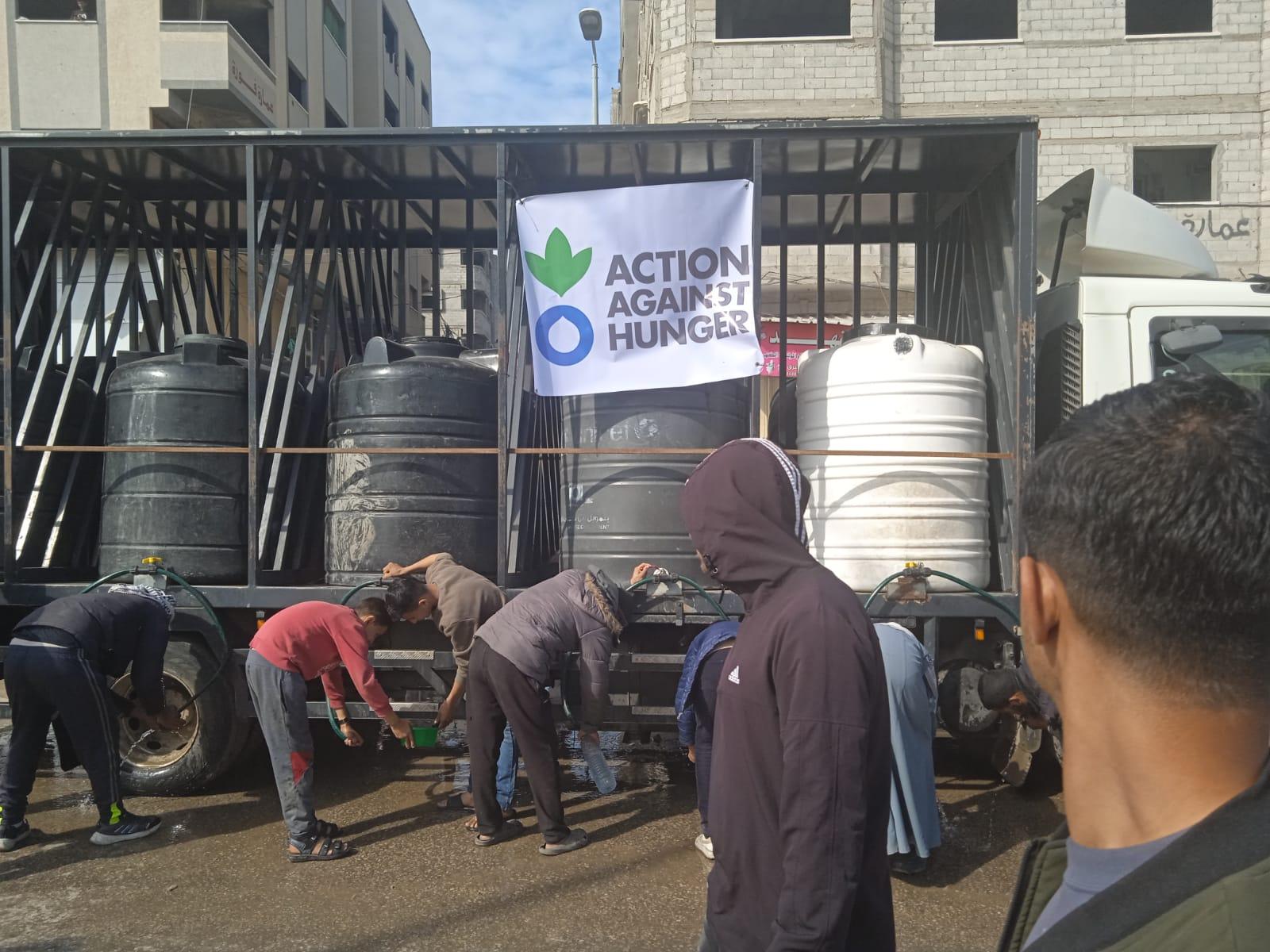

FIVE REASONS WHY IT IS ESSENTIAL THAT HUMANITARIAN AID REMAINS LED BY HUMANITARIAN ORGANIZATIONS
Madrid/Jerusalem. 28 May 2025.
Action Against Hunger has been working in Gaza for over 20 years. Since October 2023, we have supported more than 1 million people through various sectors such as nutrition, food security, livelihoods, water, sanitation, and hygiene. We coordinate with the UN, other humanitarian organizations, and local partners to quickly and effectively reach those who need it most.
Humanitarian principles. Humanitarian organizations are strictly governed by fundamental humanitarian principles: humanity, neutrality, impartiality, and independence. Only work under these principles guarantees support to the civilian population without any discrimination and ensures that organizations can, and must, operate independently, without political or military interference. The protection of these principles is a legal obligation and is an essential condition for an effective and dignified response.
"We have been working in Gaza for 20 years strictly under humanitarian principles. We do this in Gaza and all around the world," says Natalia Anguera, Head of Operations in the Middle East for Action Against Hunger. "As an organization, we do not support and will never accept to collaborate with any mechanism that does not comply with fundamental humanitarian principles." She continues: "We firmly support the coordinated response of the United Nations, of which we are a part, as the most viable framework based on humanitarian principles. This system has been tested, is already operational and guarantees immediate and coordinated action for the supply of large-scale aid without delay. We cannot afford to divert attention or jeopardize the resources of proven mechanisms when lives are at stake."
Vulnerability criteria of the population. The identification of the individuals to whom humanitarian organizations provide support is based on rigorous criteria of vulnerability and needs. Our humanitarian approach prioritizes those facing higher risks of food insecurity, malnutrition, forced displacement, or lack of access to basic services and goods.
"Humanitarian organizations have expert teams that carry out technical assessments, context analyses, and consultations with communities to identify vulnerabilities, understand where they are, and ensure that aid reaches in the right form and place," highlights Natalia Anguera.
“The absence of this prior analysis can lead to situations of inequality, where one person accesses multiple aid packages while others, in conditions of greater risk, remain excluded,” adds Natalia Anguera. Unaccompanied minors, women, elderly people, or those with disabilities are some of the groups that could be left unattended if appropriate mechanisms are not implemented. This lack of focus not only compromises humanitarian principles but also perpetuates dynamics of discrimination and exclusion within the affected communities.
Thanks to this approach, at Action Against Hunger we provide assistance to especially vulnerable populations, such as children and women. However, even within these populations, we identify the most vulnerable: malnourished children, pregnant and breastfeeding women, among others, organizing the response based on these profiles of vulnerability and needs.
Comprehensive aid. To address the enormous humanitarian needs in Gaza, it is not enough to distribute food packages. The humanitarian mechanism of which Action Against Hunger is a part provides multisectoral assistance to effectively respond to the multiple and interrelated needs of the population – we do it like this in Gaza, as well as in many other parts in the world.
To prevent famine or to address cases of malnutrition, it is important to provide assistance not only through food distribution but also through the distribution of nutritional supplements and trainings on how to use them; kitchen utensils; the provision of clean and safe water to prevent the most vulnerable from falling into malnutrition; and the distribution of cash so that families who have lost their sources of income can buy and afford what they need most. For example, Action Against Hunger has supported more than 1 million people since October 2023 through various sectors such as nutrition, food security, livelihoods, water, sanitation, and hygiene.
And all of this, in a coordinated manner.
Coordination is key. Humanitarian organizations coordinate with the UN, international donors, civil society organizations and private sector suppliers that are part of the humanitarian mechanism to ensure an effective, coherent, and equitable response to crises.
"We all work together to avoid duplicities, optimize available resources, and ensure that aid reaches people who need it, leaving no one behind," emphasizes Natalia Anguera. "This collaboration allows us to complement capacities, share key information, and set priorities, which strengthens the collective impact of humanitarian action and improves the coverage and quality of assistance."
Assistance must reach the population, not the other way around. The entry of humanitarian aid into Gaza is currently very limited in quantity, but also in the number of entry and distribution points. Limiting entry to a single corridor not only restricts the volume of assistance that can arrive but also forces the population to move in extremely dangerous conditions to access basic resources.
"This generates overcrowding, tensions, and leaves those who cannot move without coverage. Aid must reach directly to where the population is located," explains Natalia Anguera.
